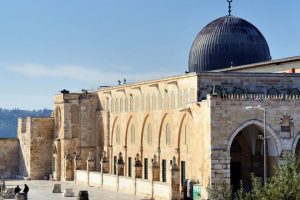
No matter the religion one adheres to, religious festivals serve as a much-anticipated time every year for providing spiritual uplift; an opportunity for prayer and reflection, and to get away from the everyday hustle and bustle of life while spending quality time at home with family and friends. But as it seems with just about everything else, the festivals of 2020 will be noticeably different.
As of April 8, 2020, the World Health Organization reports a total of over 1.3 million confirmed cases of COVID-19 and more than 79,000 deaths worldwide. The virus has forced about 1.5 billion students around the world to stay home from school – that’s 90% of the world’s student population. This pandemic is hitting hard in all facets of life. But there still remains an area of unchartered territory in the effects of this global pandemic. April marks the celebration of some of the most renowned religious festivals; Passover for Jews, Easter for Christians, and this year Ramadan begins in April leading into Eid-ul-Fitr in May for Muslims. These landmark religious occasions all consist of communal gatherings – exactly the kind of thing which most governments around the world have effectively put an end to. So how will these occasions be celebrated?
The reality is that everyone will have to accept their yearly traditions and rituals are going to change. With laws on social distancing being enforced globally, gatherings in places of worship and even in homes have been halted. Undoubtedly, these occasions will be held on a smaller, more individual basis. However, religious leaders are urging adherents to understand that these occasions can be celebrated with a new perspective.
Passover marks the freedom of Jews from their oppressors after the manifestation of the ten plagues (natural disasters sent by God in order to free the Israelites from the grasp of the Pharaoh). In light of COVID-19, which some are calling the ‘eleventh plague,’ the way in which Passover will be commemorated this year seems to draw a stark connection to its origins. While speaking to The New York Times about this year’s Passover celebrations, Rabbi Noam Marans, director of interreligious relations at the American Jewish Committee, quotes a passage from the Haggadah (a sacred text recited during this festival): “This year we are enslaved – next year we will be free.’ That aspiration is very real this year,”[i]
The largest effects of social distancing will be upon the Seders, or ritual feasts marking the beginning of Passover, where multiple generations of families and friends gather to commemorate the occasion. The Rabbinical Assembly has provided guidelines as to how the Passover should be celebrated this year. Pertaining to Seders they say:
Thus, Jewish leadership has been guiding Jews around the world in celebrating an isolation-conducive Passover. For example, an influential group of Rabbis in Iran declared that Passover could still be shared with family and friends over video conference call. In fact, US synagogues have cancelled all proceedings and gatherings and are making arrangements for online streaming.
No doubt it’s a difficult time and for many, a change in generations of traditions. However, Rabbi Zalman Schmotkin of the Chabad-Lubavitch movement puts things into perspective, when he tells the New York Times that difficulties are a part of the spirit of Passover, and “to supersede that and break out, find a way to see godliness in it.”[iii]
Although the Prime Minister of New Zealand declared the Easter Bunny to be an “essential worker,”[iv]Easter festivities are sure to see a significant difference from what most are accustomed to. It’s something which Christian communities around the world are bracing for and working around. This Easter is going to be more of an online affair; a trend which the Church has already started to see. At the beginning of the pandemic, online viewership of Sunday masses on the Archdiocese of New York website was about 600. Since then, the numbers have grown to about 26,000 and are expected to increase for the Easter services. It has similarly been reported that streams for services by Pastor Robert Jeffress from the First Baptist Church in Dallas have jumped from 40,000 to 200,000.
Though online services are quite commonplace, the vast increase in viewership over recent weeks aptly illustrates the situation at hand. As for Easter, the Church is taking the same approach- taking advantage of technology to maintain as much normalcy as possible in the faith’s most sacred festival. Though it could never replace the feeling of dressing in one’s Sunday best and gathering in Church for communal worship, the Church of England has provided guidelines as to how Christians can celebrate Easter at home, providing a positive outlook, despite the situation at hand:
We can discover how what we are now experiencing may contribute to our own ongoing journey as God’s people. The homes in which we now mainly find ourselves offer us a place in which our faith can be discovered afresh.[v]
For example, some things can remain as per usual, with the preparing of an Easter garden at home and painting Easter eggs. But then there are the obvious differences, such as, “Observing the Easter Vigil in some form at home…Some networks are planning recorded or live-streamed vigils with wide participation.”[vi]At a national level, the Archbishop of Canterbury, senior bishop and principal leader of the Church of England, is scheduled to post reflections on his Facebook page as well as his website. As for Easter day itself, bishops and priests have been advised that they can observe the Holy Communion in their homes while others can partake in musical activities, singing hymns and songs in their homes. In place of attending Church for Easter services, worshippers can tune into a BBC radio broadcast and the Church of England Facebook page for the Archbishop of Canterbury’s Easter service. Yet no matter the alternatives, there are some aspects which just won’t be the same, such as practicing Spiritual Communion rather than receiving the Holy Communion, “Practising spiritual communion as this is a day on which all ought otherwise to receive Holy Communion in church.”[vii]
These are hard-hitting realities; things which some may have been accustomed to doing their entire lives are seeing drastic changes. The optics of this will perhaps be best captured by the scene expected at St. Peter’s Square in Vatican City. A place converged upon by tens of thousands each year for the Pope’s annual address will be entirely empty this year, due to the imposed lockdown. The Vatican has also issued guidelines as to how this year’s Easter can be celebrated remotely, through the use of technology, “The faithful should be informed of the times of the celebration so that they can prayerfully unite themselves in their homes.” Despite the changes and new guidelines, there is still a ray of hope, as the decree states, “by mandate of the Supreme Pontiff, for the year 2020 only,”[viii]
Every year, Ramadan is nothing short of a global phenomenon. For an entire month, amidst the busy, bustling world, Muslims around the world abstain from eating and drinking, from dawn till dusk, as a means of spiritual cleansing and an opportunity for increased worship. It is to decrease one form of nourishment and increase another form of sustenance. In fact, the underlying purpose of this month is to have an increased inclination towards God as a result of detaching one’s self from the world.
It may be that the current situation of isolation at a global level least affects the observance of Ramadan, which in itself contains an aspect of seclusion. Of course, every year, Ramadan is observed by Muslims alongside their day-to-day routines, while incorporating a pointed effort towards the increase in the remembrance of God and overall worship. For most Muslims, between the mosque, work and school, Ramadan proves to be the busiest time of the year. However, this year presents a unique opportunity for Muslims who, for the most part, are no longer occupied in going out for work and school, but are home with their families. Along with the salient aspect of fasting, the true essence of Ramadan lies in one’s increased connection with God, achieved through heightened worship and supplications. Further to the greater influence on the already observed five daily prayers, Muslims are encouraged to offer supererogatory prayers in seclusion, early in the morning, late at night, and throughout the day. Often, the best place to do this is in the seclusion of one’s home, where majority of the world finds themselves today.
In fact, it is narrated from the time of the Holy Prophet (peace and blessings of Allah be upon him) that, during the month of Ramadan, the Holy Prophet (peace and blessings of Allah be upon him) had specified a small area in his home for the offering of supererogatory prayers at night. Upon finding out, some of his companions came and joined behind him, doing so for a few nights. One morning, the Holy Prophet (peace and blessings of Allah be upon him) said to his companions, “You should pray in your houses, for the best prayer of a person is that which he prays in his house except the compulsory prayers” (Bukhari Kitabul Adhan).[ix]
Compulsory prayers, of course, refer to the five daily prayers prescribed for all Muslims. These prayers are mandatory, especially for men, to be offered in the mosque, or at the very least in congregation. Particularly in the month of Ramadan, mosques see a great increase in attendance for all five daily prayers, along with various other classes revolving around teaching the Holy Qur’an held throughout the month. It proves to be a yearly display of increased comradery in faith and learning. But as the eerily empty images of the Holy Ka`ba in Mecca, the most frequented mosque in the world, have been circulated, the same image of emptiness is reflected in mosques all around the world. So, whereas isolation may be conducive to the offering of supererogatory prayers, the offering of five daily prayers in the mosque, a hallmark especially during the time of Ramadan, may well not take place. If so, it will be an odd experience for children who have become accustomed to visiting the mosque daily and assisting in distributing dates and water for the breaking of the fast; and just as odd for the elders who have known nothing else than Ramadan and the mosque being synonymous. Such drastic times indeed require drastic, albeit temporary changes. There are examples from the time of the Holy Prophet (peace and blessings of Allah be upon him) which enlighten Muslims as to what should be done when it is unsafe to leave the home for prayer:
“Once on a very cold and stormy night, Ibn `Umar pronounced the Adhan[call] for the prayer and then said, “Pray in your homes.” He (Ibn `Umar) added. “On very cold and rainy nights Allah’s Messenger (peace and blessings of Allah be upon him) used to order the Mu’adhdhin [caller to prayer] to say, ‘Pray in your homes” (Bukhari Kitabul Adhan).[x]
Thus, in light of the contagious environment where it is unsafe to leave the home, Muslims have been instructed to pray in their homes. This does not mean that the aspect of congregational prayer cannot remain intact. In an address from his office to millions on March 27, 2020, the World Head of the Ahmadiyya Muslims Community, His Holiness, Hazrat Mirza Masroor Ahmad (may Allah be his Helper) said:
I would also like to say to the members of the Jama’at [community] that the government has imposed restrictions on attending the mosque in light of the current outbreak…The formal congregational prayers cannot be offered in the mosque. Hence, in these circumstances, the members of the Jama’at should offer prayers in congregation and also the Friday prayers in their homes. They can read an extract from the Malfoozat [sayings and discourses of the Promised Messiah (peace be upon him)], the books of the Jama’at, other writings of the Promised Messiah (peace be upon him), Al-Fazl, Al-Hakam, or from any other periodicals of the Jama’at and deliver the Friday sermon. Any adolescent or adult male of the house can lead the Friday prayers as well as the congregational prayers.[xi]
The Friday prayers are also an integral part of Muslim worship. It is considered a joyous occasion every week; yet another opportunity for increased worship. In other words, it is a sort of Eid. Similarly, the end of Ramadan is marked by the celebration of Eid, an opportunity for families to gather, secondary to the Eid prayer itself. Yet with this pandemic increasing by the day, it may be that the same instructions apply to those celebrations as well. However, His Holiness expressed a sense of positivity, no matter the situation at hand:
When people start preparing to lead the Friday Sermon at home they will have to research, which will lead to their knowledge increasing. Thus, remaining at home through the government lockdown will become a means of spiritual and educational benefit.[xii]
It’s the perfect encapsulation for the adjustment which people of all faiths are having to make. No matter the fact these occasions will be commemorated at a smaller scale in homes, not only can this time help strengthen and improve our domestic lives, it’s an opportunity for deeper reflection, fervent worship, and greater appreciation.
[i]https://www.nytimes.com/aponline/2020/04/05/us/ap-virus-outbreak-pandemic-passover.html
[ii]https://www.rabbinicalassembly.org/story/kashrut-subcommittee-recommendations-passover-5780-light-covid-19
[iii]https://www.nytimes.com/aponline/2020/04/05/us/ap-virus-outbreak-pandemic-passover.html
[iv]https://www.bbc.co.uk/newsround/52184412
[v]https://www.churchofengland.org/more/media-centre/coronavirus-covid-19-guidance-parishes/holy-week-and-easter-2020
[vi]https://www.churchofengland.org/more/media-centre/coronavirus-covid-19-guidance-parishes/holy-week-and-easter-2020
[vii]https://www.churchofengland.org/more/media-centre/coronavirus-covid-19-guidance-parishes/holy-week-and-easter-2020
[viii]https://catholicherald.co.uk/vatican-publishes-guidelines-for-easter-celebrations-during-coronavirus/
[ix]Bukhari Kitabul Adhan (Call to Prayer)
[x]Bukhari Kitabul Adhan (Call to Prayer)
[xi]https://rorenglish.wpengine.com/20828/official-english-translation-special-address-by-worldwide-head-of-the-ahmadiyya-muslim-community/
[xii]https://rorenglish.wpengine.com/20828/official-english-translation-special-address-by-worldwide-head-of-the-ahmadiyya-muslim-community/
Other Sources




Add Comment